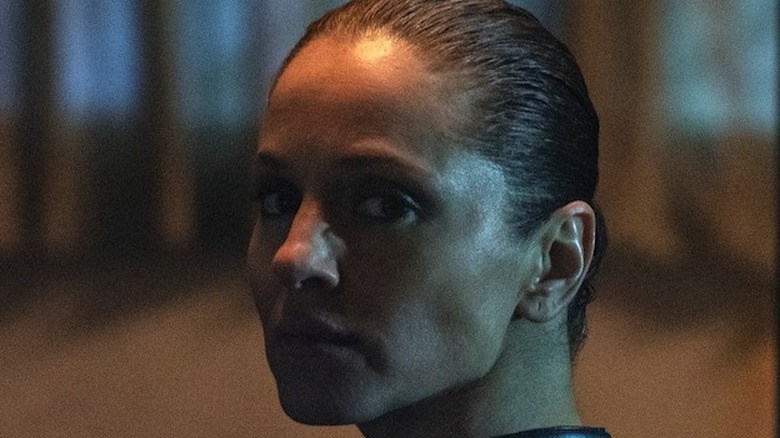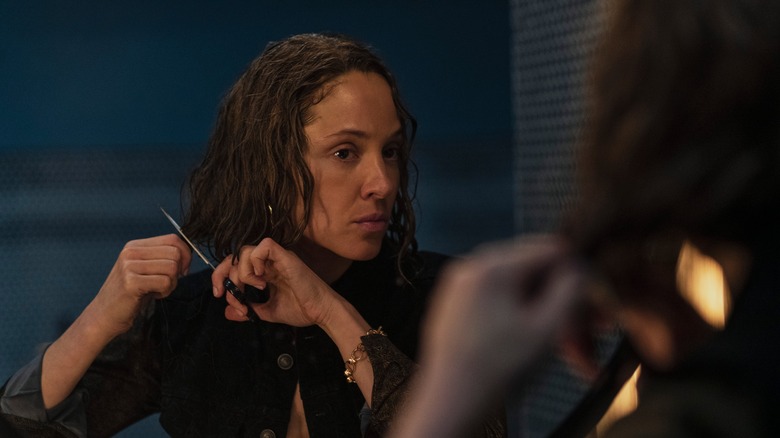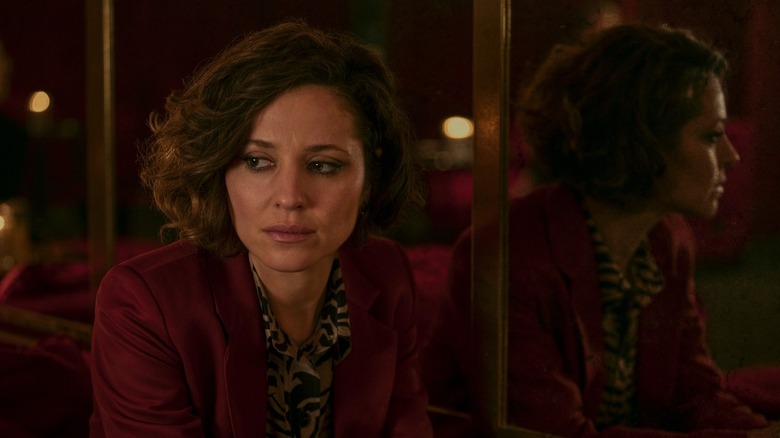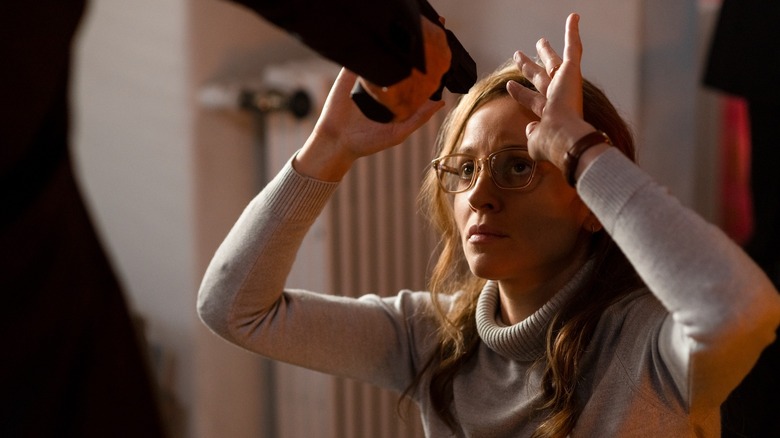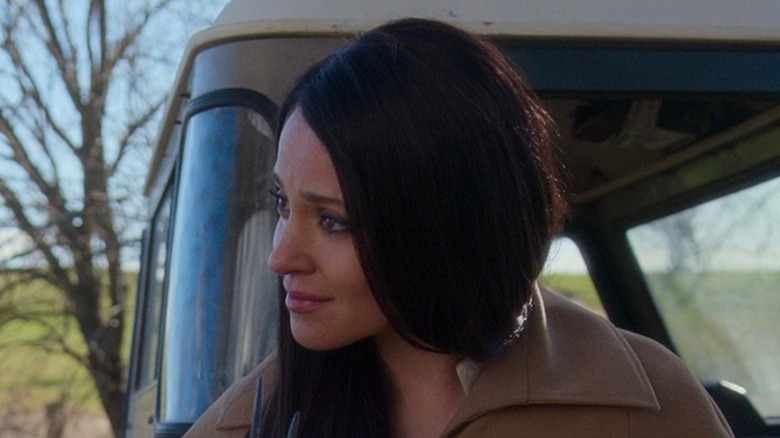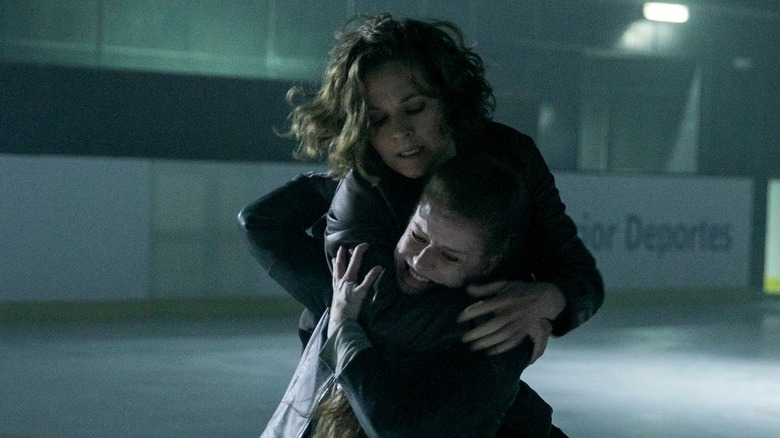Adam Glass And Margarita Levieva Bring Real Life Experiences To In From The Cold - Exclusive Interview
Netflix's new spy series "In From the Cold" focuses on Jenny Franklin, an American mother who travels to Spain to chaperone her 17-year-old daughter's ice-skating competition. Soon after arriving, her quiet life is upended when the CIA force her out of hiding, citing evidence that she is a former KGB spy who was also the product of an experiment that granted her surprising abilities. Offered the option to lose everything or help stop a series of crimes, Jenny must use all the skills she learned before she left Russia to stop a villain who is somehow linked to her past.
From "Red Sparrow" to "The Americans" and "Black Widow," Russian-trained operatives are a popular trope in pop culture. However, "In From the Cold" most closely resembles the landmark series "Alias." While it has plenty of shocking twists, jaw-dropping turns, and visceral action, it's also grounded in real emotion and poignant familial relationships. The show was created by Adam Glass, who has written and produced for series as varied as "Supernatural," "Criminal Minds: Beyond Borders," and "The Chi." He's used the breadth of his TV background to create a heady mystery led by a complex woman who is as compassionate as she deadly. That woman is played by Margarita Levieva, whose filmography includes key roles in everything from the dramedy "Adventureland" to the prime time soap "Revenge" and from the thriller "The Lincoln Lawyer" to the HBO drama "The Deuce."
In an exclusive conversation with Looper, Glass and Levieva discussed how their own lives fed into the creation and development of "In From the Cold," including Glass' observations as a recent empty-nester, Levieva's early life in Russia, and the way Glass' experiences working on previous TV series informed his approach to the show.
The seeds of the idea for In From the Cold
In From the Cold is quite a twisty tour de force. I have to ask, Adam, where did you come up with the idea for the show?
Adam Glass: Margarita's probably heard this now a million times. I am recently an empty nester. My kids are leaving the house. My wife is a woman [in her] mid-40s. I was watching what she was starting to go through as she transitioned [from] mom to "Now what's for me and who am I going to be in this world?"
Unfortunately, in our society, women are labeled with this expiration date, which is bulls***. I started to think to myself, "What if my wife" — because I'm a writer, and I'm crazy — "What if my wife was an ex-spy? What if she had a secret past? Things I didn't know about?"
The story started to go into all these different places. It also, for me, was a way to show the power and strength of moms and of women of a certain age who've been told by society that they're supposed to just go into the fog. It's like, "No." What if you had to revisit your past and what if you had to do things that you haven't done in a long time?
We were very fortunate to find Margarita Levieva, who was perfect for this role and in so many ways. One of the first things Margarita said to me was the script not only spoke to her as a woman now, but also spoke to her as her past and her own upbringing.
Prepping for a 'gift' of a role
Margarita, you do so much for this role, physically, emotionally. It's amazing the layers that it requires of you. How did you prepare to play this character?
Margarita Levieva: Thank you. Yeah, I have said this a million times, I'll say it again: I got an incredible opportunity and a gift from Adam Glass with this character, because as an actor, I find sometimes the roles are limiting and it's hard to find anything that is more than one or two dimensional. To be able to play a woman that is this complex and carries so much history and ability and is playing so many different parts at all times was a huge gift, and I knew would be an incredible challenge, so I had to really prep myself as much as I could.
I looked at this as going to the Olympics. I felt like everything that I had carried through my life as a human being, everything that I had learned as an actor and practiced over the years of my career, was like "This is the big game," and I get to really challenge myself now and pour all of it into this woman.
As you know, as much as Russian gymnastics training [which Levieva went through as a child] can do a lot of damage, the good part is it also taught me to work hard and prep hard. I knew that the only way that I could do this job is if I was really prepped. I used the time of quarantine in Spain, I used every moment of the day to get inside Jenny as much as possible and to find the truth of every moment that she got to live on camera.
An actor with a 'perfect background'
Margarita, you were born in Russia. Did that influence your understanding of the character?
Levieva: Of course, snd it's so incredible that Adam was able to capture it. For me — and this actually makes me very emotional in thinking about it now — so much of it, my Russian background and what being trained as a rhythmic gymnast created in me and growing up in communism too, right — I came [to America] in [1991], so I came as things broke and what I grew up with and then coming to America, which for me, was the land of the free – and so this idea of imprisonment versus freedom, and these two places that this character lived in, the prison of her past life, of her training of – not just physical training but the mental damage that was done to her, unfortunately – and then having to live this life now of access of opportunity of being in America and finding a new identity and a new freedom for herself. And how much of the past was still informing the present and how much of the past was still limiting the present, or how much of the past was enabling the present, just being able to explore all those questions is really intense and exciting.
I do that for myself, and that's why I relate so much as a character. That's something that I've explored, struggled [with], and the ride that I've been on since I've been in America.
Glass: One of the things Margarita said to me when she first met me and during the auditioning process was, we were walking out, she said, "It'd be nice if a Russian played a Russian." Because... it's like every time, it was usually an American or English actor playing a Russian [in movies and TV shows]. I did find [that] stuck in my head. I couldn't get it out after she said it. It would be nice to find somebody who had a shared experience who had done this and lived something like this. And so, Margarita was not only a great actress, but she had the perfect background too for this.
I couldn't help thinking of the "Black Widows" and other stories where the character is supposed to be Russian, but it's pretty obvious that's not the case for the actor. So I thought the convergence here was so fascinating.
Levieva: It's nice, so nice. I often watch stuff and I watch great actors who I respect and admire deeply, and it's sad sometimes to go, "Oh, right. They're representing a culture and a history that they can learn about but haven't lived through." I don't necessarily believe that an actor has to live through something to play it, but it certainly helps at times to understand.
Lessons from Supernatural, Criminal Minds, and The Chi
Adam, you've been involved in some amazing shows like "Criminal Minds: Beyond Borders" and "Supernatural." How did those experiences influence the development of "In From the Cold," especially the supernatural parts of it, which is something you don't normally see in the spy genre?
Glass: I think you are right, at the end of the day, especially as artists and craftspeople, you can't help but be influenced by everything that happened to you before. I think it really comes out in the show. There's an aspect of it that has a procedural element to it, of a case that we're working. That comes from my "Cold Case" and my "Criminal Minds" backgrounds. Then, there is, to your point, this supernatural aspect of it. What I learned on "Supernatural" was how to ground things in emotion, right? You know, ["Supernatural" main characters] Sam and Dean, that's really what the show's about, these two brothers and their love for each other and what they're willing to do. People always use the term of, "I'll go to hell and back for someone." These guys actually do go to hell and back for each other, so you're following that story. Again, even though we have some stuff in here, it's all emotion, it's all grounded in reality.
I've done a lot of drama too, from "Barkskins" to "The Chi" and that stuff. One of the things Margarita and I and the cast talked about from the beginning was, let's play this real, let's play this emotional. We were, in our minds, making a drama. We knew we were making a spy show, don't get me wrong, but it was always about reality. What's the real emotional [connection], what's the real feeling, and what really would somebody be going through in this, no matter how crazy the story gets spy-wise or with any of the genre stuff. It was really important to us that it was always true, emotionally.
The show ends on a huge cliffhanger. Is there anything you can tease about where the show might go from here if it's picked up for Season 2?
Glass: Well, it's up to you to make it happen. Tell all your friends and family to watch it so that we can get there. We already know where Season 2 and even Season 3 would go. There's a big story to tell here, and we hope we get a chance to keep telling that story.
A spy show with heart...that still kicks ass
I've always been a fan of shows like "Alias," so I really appreciated seeing something like [this show]: a spy show that also [has] that heart.
Levieva: Well, what Adam said, I personally played it like a [director and actor John] Cassavetes movie. I never thought we were making a spy thriller or a genre show, so that was my template.
You still kicked ass though.
Glass: She kicked ass. She did 99% of her own stunts. It was amazing. She is the Tom Cruise of our show. It was like, "Jump off this thing, do this," like almost to the point [that] we're like, "No, you can't do that," and she will be like, "I'm doing it."
I don't have many episodes you saw, but we had this unbelievable fight in Episode 4 that happens in the Hamman, which would be in an American sort of spa. It was a two-day shoot, and Margarita did so many of her stunts, and at the same time, Caitlin [McNerney], who was [her] stunt double, is amazing.
Levieva: Incredible.
Glass: Unbelievable. The other thing is that it was really important for us, not only to have her look real and be real (and being a dancer and being a gymnast I think really helped with that), that Margarita was able to do most of her stunts. On top of it, having [women fighting each other], which you don't see often and as brutal and as badass as we were trying to make it. That was really important to us too.
"In From the Cold" is now streaming on Netflix.
This interview has been edited for length and clarity.
